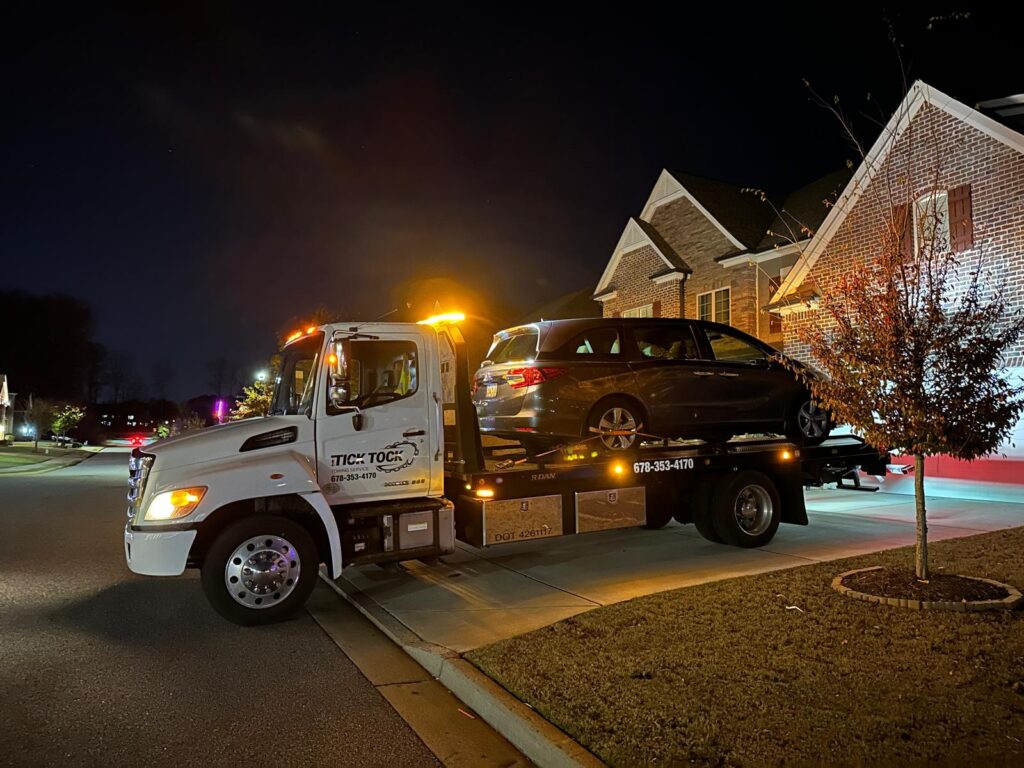Winter weather brings a unique set of challenges for vehicle owners, from freezing temperatures to snow-covered roads. As a leading towing company in Cumming, we know firsthand how winter conditions can affect your vehicle’s performance and reliability. That’s why it’s crucial to stay on top of winter vehicle maintenance to avoid costly breakdowns and ensure your car remains safe and reliable all season long.
In this blog post, we’ll share some essential tips to help you maintain your vehicle this winter, so you can keep driving with confidence and avoid unnecessary trips to the mechanic or towing company.
1. Check Your Battery
Cold weather can take a toll on your car’s battery. In fact, your battery’s power can decrease significantly when temperatures drop, leading to starting problems. Here’s what you can do:
- Test the battery: Have your battery tested before winter sets in. A battery that’s already weak will struggle to handle the cold.
- Clean the battery terminals: Corrosion on the battery terminals can prevent the car from starting. Clean the terminals and ensure they’re tightly connected.
- Replace old batteries: If your battery is over three years old, it’s worth considering a replacement before the winter months to avoid being stranded with a dead battery.
2. Inspect and Maintain Your Tires
Winter driving often means navigating icy, snowy, or wet roads. Your tires are your first line of defense, so it’s essential to make sure they’re in good condition.
- Check tire pressure: Cold temperatures can cause your tires to lose pressure, which reduces traction and increases the risk of blowouts. Check tire pressure regularly and inflate them to the manufacturer’s recommended levels.
- Inspect tread depth: Worn tires with low tread depth won’t grip the road properly in winter conditions. If your tires show signs of wear, consider investing in a new set, or opt for winter tires specifically designed to perform better in cold and snowy conditions.
3. Change to Winter-Ready Fluids
During the winter months, the fluids in your car become even more important for performance and protection.
- Check engine coolant: Make sure your vehicle’s coolant mixture is appropriate for cold weather. Use a 50/50 mix of antifreeze and water to prevent the engine from freezing.
- Use winter-grade oil: Cold temperatures can cause thicker oil to flow less efficiently. Switch to a winter-grade oil (lower viscosity) to ensure your engine runs smoothly.
- Top up windshield washer fluid: The winter months often bring road salt and grime that can build up on your windshield. Make sure to use winter windshield washer fluid that won’t freeze and top it up regularly.
4. Inspect Your Brakes and Suspension System
When roads become slippery, you’ll want to make sure your brakes and suspension are in excellent working condition.
- Brake check: Winter driving may require more frequent braking, especially on icy roads. Make sure your brake pads and rotors are in good condition and functioning correctly.
- Suspension inspection: If your suspension system is worn, it could lead to poor handling in snowy or icy conditions. Have your suspension checked to ensure your vehicle can handle bumps and rough roads during winter driving.
5. Replace Your Wiper Blades
Your windshield wipers are essential in winter, helping you maintain visibility during snowstorms or heavy rainfall.
- Check wiper blades: Inspect your wiper blades for any cracks, tears, or stiffness. If they’re worn out, replace them before the first snowstorm.
- Use winter wiper fluid: Regular wiper fluid can freeze in cold temperatures, so make sure you’re using winter wiper fluid, designed to prevent freezing and keep your windshield clear.
6. Prepare an Emergency Kit
Winter driving can be unpredictable, so it’s important to be prepared for emergencies. Having a well-stocked emergency kit in your vehicle can make all the difference.
Include items such as:
- Blankets: Keep warm in case you get stranded.
- Jumper cables: If your battery dies in the cold, jumper cables can help you get going again.
- Ice scraper and snow brush: Clear off snow and ice from your windows and mirrors.
- Non-perishable snacks and water: If you get stuck, these can be a lifesaver.
- First aid kit: Always be prepared for the unexpected.
7. Keep Your Gas Tank Full
In winter, it’s a good idea to keep your gas tank at least half full. This helps prevent moisture from forming in the fuel lines and ensures you have enough fuel if you’re stuck or need to keep your vehicle running for warmth in an emergency.
8. Drive Carefully and Adjust for Winter Conditions
While vehicle maintenance is key to surviving winter, your driving habits also matter.
- Slow down: When the roads are slick with snow or ice, give yourself more time to stop. Slow down and drive cautiously, especially in adverse conditions.
- Increase following distance: Allow extra space between your vehicle and others. In winter conditions, it takes longer to stop, and maintaining a safe distance is crucial.
9. Keep Your Vehicle Clean
Winter roads are often salted to help melt snow and ice, but this salt can damage your vehicle’s paint and undercarriage. Keep your vehicle clean by washing it regularly during the winter months to remove salt and grime buildup.
10. Trust Your Local Towing Company for Winter Emergencies
Even with the best preparation, accidents and breakdowns can still happen. When you find yourself in need of a tow, trust the experts at [Your Towing Company Name] to provide fast, professional towing services in Cumming and surrounding areas. Our experienced team is ready to respond 24/7, ensuring that you’re never left stranded for long.

